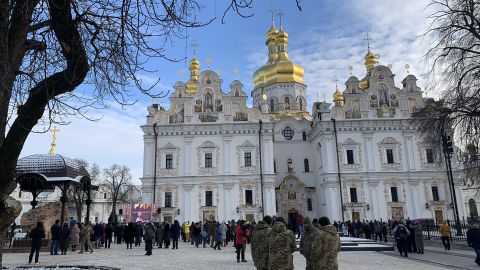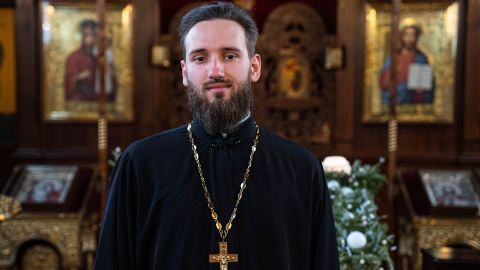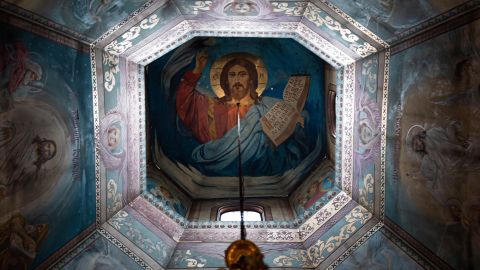CNN
—
The vertically shot video published last November shows no weapons, battlefield atrocities or even soldiers. But the sound of a patriotic Russian song reverberating through a church on Kyiv’s famous Lavra monastery grounds seemed to open a new front in Ukraine’s war with Russia.
The church belongs to the Ukrainian Orthodox Church (UOC) – which, despite the name, has traditionally been loyal to the Russian Orthodox Church, and whose current leader Patriarch Kiril has openly supported Moscow’s brutal invasion. Splitting with Kiril, the leadership of the UOC denounced Russia’s attack, and last May, declared its independence from Russia.
In a sermon days after the split, Patriarch Kiril said he was praying that “no temporary external obstacles will ever destroy the spiritual unity of our people.”
Days after the video surfaced, masked members of the Ukrainian Security Service (SBU) conducted a raid on the Lavra – officially, to prevent it being used for “hiding sabotage and reconnaissance groups” or “storing weapons.”
By December, a handful of church leaders had been sanctioned, and dozens more churches across the country were raided by the SBU – though the searches turned up little more than a few Russian passports, symbols and books.
“There was no mention in the findings of weapons or saboteurs. What they said they found was printed matter, documents, which are not prohibited under Ukrainian law,” UOC Bishop Metropolitan Klyment told CNN in an interview.

There is plenty of gray area, however. In a statement the Security Service of Ukraine (SBU) told CNN that it’s not illegal to store Russian propaganda, but it is to distribute it. “If such literature is in the library of the diocese or on the shelves of a church shop, it is obvious that it is intended for mass distribution,” the statement read.
It insisted that the raids on the Ukrainian Orthodox Church “are aimed exclusively at national security issues. This is not a matter of religion.” Vladimir Legoyda, a spokesperson for the Russian Orthodox Church, however, slammed the searches as an “act of intimidation.”
Professor Viktor Yelenskyi, Ukraine’s newly appointed religious freedom watchdog, said that for more than 30 years the UOC leadership has been “poisoning people with the ideas of the Russian world.” He defended the SBU’s raids, comparing them to the crackdown on Islamic extremism after 9/11. “Ukraine is still a safe haven for religious freedom.”
Yet, at the end of 2022, the government declined to renew the church’s lease on its massive, central Lavra cathedral and turned over the keys to the similarly named, but completely separate Orthodox Church of Ukraine (OCU). The rival OCU celebrated Orthodox Christmas (on January 7) mass there for the first time this year.
Speaking outside the church on Christmas Day, Alla, who declined to give her last name, said, “I think it should’ve been done a long time ago.”
“We’ve been tolerating this [UOC] evil and closing our eyes as we thought we should be tolerant, but the war brought it all to surface.”

The Ukrainian Orthodox Church held this year’s Christmas mass at a smaller church down just steps from the cathedral. Kyrylo Serheyev, a student at the lavra seminary, said this year especially, he’s praying for Ukrainian troops. And despite government sanctions and scrutiny of his church, he insists “our patriotism is not becoming less.”
Viktoria Vinnyk said she was sad not to have mass in the central cathedral this year. Though she speaks Russian, she’s never been to Russia.
“I hope for better in my country. And I hope that the situation will change,” she said.
The cathedral isn’t the only holy site to change hands. Outside Kyiv, in the village of Vita Poshtova, a small church has sat perched on a hillside above the frozen lake since the Soviet era. It’s the only one in the village. In September the congregation voted to convert the church from UOC to the independent OCU. Parishioner Olha Mazurets says she was uncomfortable with any connection to Russia.
“It’s a matter of identity and self-preservation. We must identify our enemy too,” she told CNN.

Father Pavlo Mityaev, the newly appointed priest says before war, “people didn’t pay attention to whether it was a Ukrainian or Russian-speaking church, they were coming to God. But when the war started, everything changed.”
According to Klyment, up to 400 of the UOC’s 12,000 churches in Ukraine have converted to the OCU since the war began.
The security services says that since the full-scale invasion began, 19 church clergy have been charged and five have been convicted.
In December, UOC priest Andriy Pavlenko was sentenced to 12 years for passing information about Ukrainian battlefield positions in the Donbas to the Russians. A week later, he was sent to Russia as part of a prisoner exchange.
Klyment acknowledges that priest’s guilt but dismisses other cases – like the Vinnytsia priest indicted just this week for disseminating pro-Russian propaganda – as hollow accusations. He thinks the wider church is being unfairly tarnished.
“Members of the Ukrainian Orthodox … are citizens of Ukraine, and sometimes among the best citizens of Ukraine, proving their patriotism with their own lives,” he said referring to UOC members fighting on the front lines.
In his nightly address on December 1, President Volodymyr Zelensky indicated he was prepared to go beyond raids – proposing a law to ban churches with “centers of influence” in Russia from operating in Ukraine – all in the name of “spiritual independence.”
“We will never allow anyone to build an empire inside the Ukrainian soul,” he said.
But Klyment believes that law would merely push his church underground.
“What else do you call persecution if not this?” he asked.
Stay connected with us on social media platform for instant update click here to join our Twitter, & Facebook
We are now on Telegram. Click here to join our channel (@TechiUpdate) and stay updated with the latest Technology headlines.
For all the latest World News Click Here
